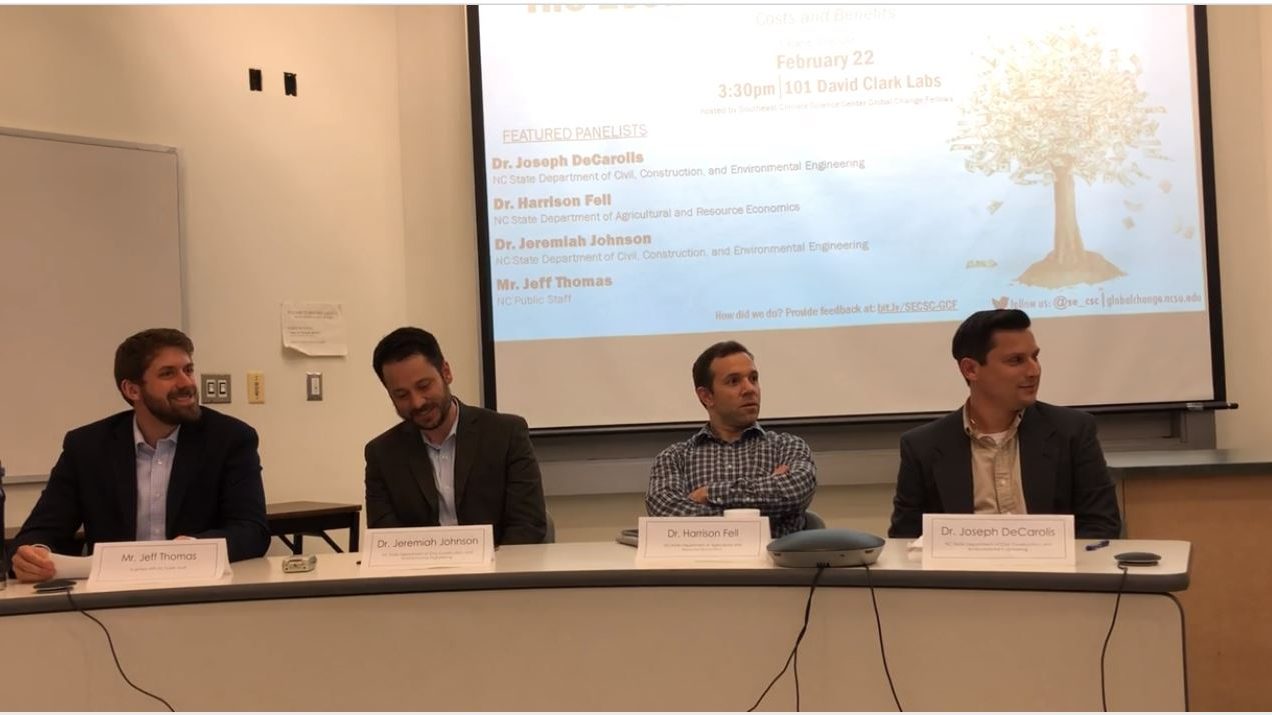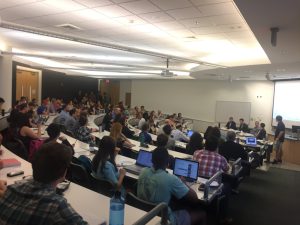Discussing The Economics of Climate Change


This post was written by Emily Reed, Spring 2018 Global Change Fellow.
The Spring 2018 Southeast Climate Science Center Global Change Fellows hosted their second seminar on February 22, 2018: “The Economics of Climate Change: Costs and Benefits.” Over 100 people joined us on NC State’s campus and remotely to discuss the financial burdens of both climate change mitigation and inaction. Moderated by Fellow Mike Madden, panelists included three professors from the Sustainable Energy Systems and Policy cluster at NC State — SE CSC Faculty Affiliate Dr. Joe DeCarolis, Dr. Jeremiah Johnson, and Dr. Harrison Fell – and Jeff Thomas, an NC State alumnus and engineer with the North Carolina Public Staff.
Over the course of an hour, the panelists answered 19 questions from the moderator and audience members. Topics included the recent solar tariffs and their effects on North Carolina, the pros and cons of carbon taxes and cap and trade systems, and the ways that climate change has impacted the economy already. Several reoccurring themes were the need for policy action, the difficulty in quantifying the costs of climate change, and that everything—action and inaction—is expensive.
Discussions about the cost of conservation and humanitarian work have always made me a little queasy. I don’t think I’m alone in feeling like we lose touch with the human dimensions of issues when we talk numbers and statistics, and that can be uncomfortable. Coming into the seminar with that outlook, I was struck by the level of engagement and energy in the room and the ability of the panelists to deftly navigate thorny subjects.
For example, when asked about the perceived choice between saving the environment and saving jobs, the panelists were quick to both acknowledge those concerns and offer counterexamples. DeCarolis noted that there are four times as many US jobs in solar installation than in coal. Johnson pointed out that renewable energy can be cost-effective on its own merits without intervention, and Thomas indicated this was true in North Carolina, which “sustains… robust solar growth while maintaining commercial and industrial electricity rates that are below the national average.”
 To follow up, Madden asked how to sustain economic growth while moving towards “greener technologies, practices, and policies.” Johnson responded by flipping the question and asking, “How can we use these things to spur economic growth?” Perhaps this reframing highlights the differences between how a trained ecologist and a trained economist view this issue. As the former, I have always thought of how we can shape the economy to work for conservation, but now I think the more appealing and convincing argument is how to use conservation to ignite economic prosperity. And, as Fell pointed out, “the idea is that the costs are paying off in the end by not having a climate that is inconducive to economic growth.”
To follow up, Madden asked how to sustain economic growth while moving towards “greener technologies, practices, and policies.” Johnson responded by flipping the question and asking, “How can we use these things to spur economic growth?” Perhaps this reframing highlights the differences between how a trained ecologist and a trained economist view this issue. As the former, I have always thought of how we can shape the economy to work for conservation, but now I think the more appealing and convincing argument is how to use conservation to ignite economic prosperity. And, as Fell pointed out, “the idea is that the costs are paying off in the end by not having a climate that is inconducive to economic growth.”
The panelists also discussed ways to plan for climate change outside of energy. DeCarolis cited a New York Times article that described why infrastructure bills must account for climate change, for example, by using asphalt designed to withstand higher temperatures and rapid freeze-thaw cycles. My take-away was that the best long-term solution economically is to start designing and building our cities now so that they can weather the stresses of climate change. However, to do so we must accept the inevitability of that change, and that is where economics can only take us so far. As the panel continued, we began to discuss how we can use the economics of climate change to inform decisions, and here the panelists agreed that, while important, the financial reality is rarely the basis for how we behave and think. We need the numbers to make good policy, but we also need to relate these issues to emotion and personal experience. As in our Climate Justice panel, Madden closed by asking the panelists what we can do as citizens to mitigate the costs of climate change. The response? A resounding “VOTE!”
Dr. Jeremiah Johnson: “Vote. Get your friends to vote… Register anybody that will listen to you.”
Jeff Thomas: “Vote with your money… Demonstrate demand for these types of services. You can go out and buy RECs (Renewable Energy Certificates) to encourage development of renewable resources… you can push institutions like the University of North Carolina to participate in the green source rider program.”
Dr. Joe DeCarolis: “Call political offices… Go to public forums and raise this as an issue so it’s on [your representatives’] minds. Use social media… There are no easy answers here… I think it’s just going to be constant pressure.”
- Categories: